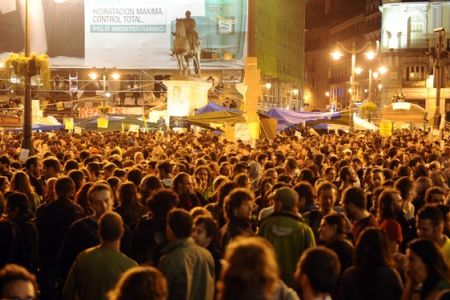 MARK WEISBROT, via Dan Beeton, beeton at cepr.net
MARK WEISBROT, via Dan Beeton, beeton at cepr.net
Co-director of the Center for Economic and Policy Research, Weisbrot said today: “While it’s clear that the G8 is able to unite quickly to keep a European as head of the IMF, they have been slow to come up with any feasible solution to the crisis in the eurozone. Continuing to squeeze the economies of Greece, Portugal, Ireland, and Spain — driving up unemployment and dragging out the recession — is just making things worse. But they haven’t even been willing to discuss any viable alternative.”
Weisbrot recently wrote the piece “Eurozone’s Periphery Needs to Challenge Right-Wing European Authorities,” which states: “The eurozone crisis is in some ways less complicated in its foundations than most people are making it. The fundamental problem is that Greece, Spain, Ireland and Portugal are stuck in recession or near-recession and are not allowed to adopt the policies that are necessary to get out of it. In 2009, most countries in the world adopted some combination of expansionary policies to get out of recession: for example, a fiscal stimulus or expansionary monetary policy (witness the more than $2 trillion that the U.S. Federal Reserve has created since our recession began). In some cases countries also got a boost from a depreciating currency, which increased their exports and reduced their imports.
“The peripheral European countries are stuck in a currency union where their monetary policy is dictated by the European Central Bank, which is far to the right of the U.S. Federal Reserve and has little interest in helping them.” Several weeks ago, Wesibrot wrote a widely-noted New York Times op-ed titled “Why Greece Should Reject the Euro.”
DAVID MILLER, davidmiller at strath.ac.uk, http://www.dmiller.info
Currently in Spain, Miller’s books include Arguments Against G8, A Century of Spin and Neoliberal Scotland: Class and Society in a Stateless Nation. He emailed the Institute for Public Accuracy: “I am currently in Barcelona and have just returned from Placa Catalunya (or ‘Placa Tahrir’ as one placard has it) where the protests continue. It is really inspiring to see the Placa filled with people during the day and at night in the small village of tents and awnings. There is food being produced, a children’s space with toys, there are people brushing away litter, there are toilets, there is a big meeting in the middle of the square and smaller meetings all around as people spread the word via a PA system, with megaphones and raised voices. There is a daily meeting at 8 a.m. which decides by popular vote the plans for the day and the spokesperson who will brief the media. There is ongoing filming of the protest. One of my colleagues delivered solidarity greetings from Scotland [by video].
“The minimum demands listed in hand-written notes and posters across the square include the nationalization of the banks, the democratization of the election process, the proclamation of basic rights and fundamental reform of the criminal justice system.
“I found it particularly poignant that this is happening at the top of the Ramblas which has such a resonant history of popular democratic organization. A large poster displayed in the square nods to this. It shows the Barcelona barricades under popular control in the 1930s.” Miller is professor of sociology at the University of Strathclyde in Scotland. He will be leaving Spain for the UK late Friday.
For more information, contact at the Institute for Public Accuracy:
Sam Husseini, (202) 421-6858; or David Zupan, (541) 484-9167